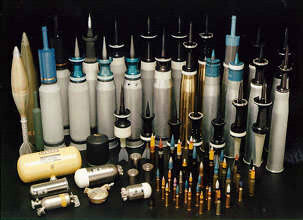hankyoreh
Links to other country sites 다른 나라 사이트 링크
US Forces Korea possesses depleted uranium ammunition

US Forces Korea is currently in possession of depleted uranium ammunition, Air Force Chief of Staff Gen. Jeong Kyung-doo said on Oct. 11.
The revelation about the weapon, which prompted fears of radiation contamination in the 1990s, is expected to generate controversy.
“We [the South Korean military] do not have any depleted uranium ammunition, but USFK does possess it,” Jeong said in a parliamentary audit of Air Force headquarters by the National Assembly National Defense Committee held at Gyeryongdae in South Chungcheong Province that day.
“Depleted uranium” refers to uranium waste left over after enrichment of the element for use as fuel in nuclear power generation. The US military developed depleted uranium in the 1980s after noting its outstanding penetration capabilities, with proportions 2.4 higher than iron and 1.7 higher than lead. USFK‘s possession of depleted uranium ammunition was also confirmed in Mar. 1997 following a report in Hankyoreh 21, a weekly newsmagazine.
Depleted uranium ammunition became a source of serious global controversy after its use by US troop during the Gulf War in 1991. Some suggested at the time that the ammunition was responsible for the “Gulf War Syndrome” that emerged among some veterans, with symptoms such as chronic fatigue and headaches. The claim was that radioactive dust produced from the ammunition’s impact entered the body through the respiratory organs, resulting in cancer and other diseases.
In response to the controversy, USFK told the Hankyoreh 21 in 1997 that the production, transportation, and storage of depleted uranium ammunition was controlled by the US Nuclear Regulatory Commission, that related work was only permitted to people with a lawful permit recognized by that commission, and that those permits could only be used in situations where actual hostile acts had occurred.
By Park Byong-su, senior staff writer
Please direct questions or comments to [english@hani.co.kr]

Editorial・opinion
![[Guest essay] Amending the Constitution is Yoon’s key to leaving office in public’s good graces [Guest essay] Amending the Constitution is Yoon’s key to leaving office in public’s good graces](https://flexible.img.hani.co.kr/flexible/normal/500/300/imgdb/original/2024/0416/8917132552387962.jpg) [Guest essay] Amending the Constitution is Yoon’s key to leaving office in public’s good graces
[Guest essay] Amending the Constitution is Yoon’s key to leaving office in public’s good graces![[Editorial] 10 years on, lessons of Sewol tragedy must never be forgotten [Editorial] 10 years on, lessons of Sewol tragedy must never be forgotten](https://flexible.img.hani.co.kr/flexible/normal/500/300/imgdb/original/2024/0416/8317132536568958.jpg) [Editorial] 10 years on, lessons of Sewol tragedy must never be forgotten
[Editorial] 10 years on, lessons of Sewol tragedy must never be forgotten- [Column] A death blow to Korea’s prosecutor politics
- [Correspondent’s column] The US and the end of Japanese pacifism
- [Guest essay] How Korea turned its trainee doctors into monsters
- [Guest essay] As someone who helped forge Seoul-Moscow ties, their status today troubles me
- [Editorial] Koreans sent a loud and clear message to Yoon
- [Column] In Korea’s midterm elections, it’s time for accountability
- [Guest essay] At only 26, I’ve seen 4 wars in my home of Gaza
- [Column] Syngman Rhee’s bloody legacy in Jeju
Most viewed articles
- 1[Guest essay] How Korea turned its trainee doctors into monsters
- 2[Column] A death blow to Korea’s prosecutor politics
- 3[News analysis] Watershed augmentation of US-Japan alliance to put Korea’s diplomacy to the test
- 4‘National emergency’: Why Korean voters handed 192 seats to opposition parties
- 5[Photo] Cho Kuk and company march on prosecutors’ office for probe into first lady
- 6Exchange rate, oil prices, inflation: Can Korea overcome an economic triple whammy?
- 7After Iran’s attack, can the US stop Israel from starting a regional war?
- 8US grants Samsung up to $6.4B in subsidies for its chip investments there
- 9[Guest essay] Amending the Constitution is Yoon’s key to leaving office in public’s good graces
- 10Student made first call for rescue from sinking Sewol ferry